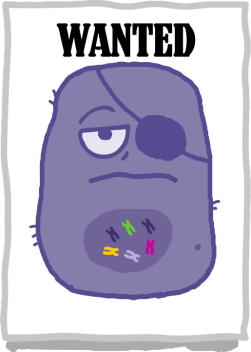
BIOMARKERS MATTER
For Patients with Cholangiocarcinoma
Biomarker testing can open the door to additional, personalized treatment options, including clinical trials.
Interested in knowing more about CCA clinical trials and treatment options?
If you’ve been diagnosed with cholangiocarcinoma, it is important that you and your doctor get as much information as possible about your tumor. Knowing your tumor’s biomarkers will help you both to make important decisions about your treatment.

Bekki SlaterThank goodness for research! Biomarker testing, also known as molecular profiling, has literally been a life-saver for me. Identifying my mutations opened up clinical trial treatment options. I am currently enrolled in a clinical trial and it has given me hope and life!
Cholangiocarcinoma Patient
What are Biomarkers?
Your body is made up of different types of cells. You can think of each cell as a little factory that produces all sorts of molecules that keep the factory running smoothly. Each type of cell produces a unique set of molecules, called a molecular “signature”. This signature helps to identify each cell and its activities.
A biomarker is any molecule that can be measured in tumor tissue, blood, or other bodily fluids. The term “biomarker” is short for “biological marker”. These markers provide a way for your doctor to monitor whether your body is operating normally or there are signs of a disease or other condition.
When you have a routine blood test, your laboratory report lists a variety of biomarkers, like your thyroid hormone levels, glucose level, and red and white blood cell counts. This lets your doctor see how your body is functioning. It can also tell your doctor how you are responding to a medication.
What are Cancer Biomarkers?
Cancer cells were once healthy cells. Damaged genes caused the cells to go rogue. These rogue cells quickly multiply, forming a tumor that crowds out healthy cells. Cancer cells can “go rogue” in many different ways. If we took a close look at the tumor cells from three people with cholangiocarcinoma, we would likely find that different molecules are driving each of their tumors.
The term “cancer biomarkers” refers to molecules that are produced either by tumor cells or by other cells in the body reacting to a tumor. You might also hear them called “tumor markers” or “driver mutations”.

Cancer biomarkers can take several forms, including:
- Gene mutations
Inside each of your cells is your DNA, which contains thousands of genes. Each gene provides the recipe for how to assemble a specific protein to help the cell function. If any of the instructions for building the protein are damaged, the protein that gets made will be faulty.
Damaged genes are said to be “mutated”. Mutations can be inherited or acquired.- Inherited mutations are present in all of your cells. They are passed down through generations and can affect your risk for getting certain kinds of cancer. Testing for inherited mutations is called “genetic testing”. This is done mainly for risk assessment, often for those who do not have cancer.
- Acquired mutations are only present in tumor cells and are identified through biomarker testing. Knowing these biomarkers is helpful in making treatment decisions. Learn more.
- Proteins
Proteins are made by both healthy and cancerous cells. But cancer cells often produce too much of a protein or an abnormal protein. This can be detected through biomarker testing.
How are cancer biomarkers used?
Cancer biomarkers may be diagnostic, prognostic, or predictive. They all offer important clues that can help direct your care.
- Diagnostic biomarkers can tell you and your doctor whether you have cancer and help determine the type and form of your cancer.
- Prognostic biomarkers help to tell you how likely a cancer is to come back or progress. They can also forecast how you are likely to do, with or without therapy.
- Predictive biomarkers can help to identify which therapies might work for your particular tumor and which might be wrong for you. These treatments may be:
- FDA-approved therapies for cholangiocarcinoma,
- A therapy already approved to treat another cancer that is being studied in a clinical trial to see if it is effective in cholangiocarcinoma, or
- A therapy still in development that is being studied in a clinical trial.
Why do biomarkers matter for people with cholangiocarcinoma?
To date, researchers have discovered that there are many biomarkers associated with cholangiocarcinoma. Each person with cholangiocarcinoma has some of these biomarkers.
Many of the biomarkers seen in cholangiocarcinoma are also seen in other types of cancer. That is especially important for cholangiocarcinoma patients because some of these other cancers have treatments that may also work in cholangiocarcinoma. In fact, there are many clinical trials going on that are studying the potential effects of these treatments on cholangiocarcinoma patients who have certain biomarkers.
That’s why your biomarkers matter!
More than 50% of patients with cholangiocarcinoma have at least one biomarker that can be treated with a known therapy. We call these biomarkers “actionable”.
Knowing which biomarkers are driving your individual tumor can help you and your doctor decide the best way to treat your cancer. It can also open the door to newer drugs and clinical trials that are only available to patients with specific biomarkers.
Which biomarkers matter in cholangiocarcinoma?
The biomarkers driving your cancer may determine the type of treatment you are offered.
Targeted Therapy
Targeted therapies focus on cells with a specific mutation, while minimizing harm to healthy cells.
Having at least one of the following biomarkers may make you eligible for treatment with an FDA-approved targeted therapy:
- FGFR2 fusions*
- NTRK fusions*
Other biomarkers may make you eligible for a clinical trial for a targeted therapy that is either still in development or already approved to treat another cancer.

* Gene fusions occur when a part of one gene attaches to part of another gene.
Immunotherapy
Immunotherapies use the power of your own immune system to treat your cancer.
Having any of the following biomarkers may make you eligible for treatment with an immunotherapy:
- Microsatellite Instability/Mismatch Repair deficiency (MSI/dMMR)
- PD-L1
- High Tumor Mutational Burden (TMB-high)

Nilofer AzadWhile having a cancer diagnosis and trying to figure out treatment options can be very overwhelming, cholangiocarcinoma is one of the cancers that has the highest chance of having at least one molecular abnormality that we have a really effective drug to target. So, by getting your tumor tested, you have a real chance of getting treatment that is tailored specifically for you.
Sidney Kimmel Comprehensive Cancer Center
John Hopkins University
How can I find out my tumor’s biomarkers?
Biomarker testing will tell you and your doctor about your tumor’s biomarkers. You might also hear it called “genomic testing”, “tumor testing” or “molecular profiling”.
There are different kinds of biomarker tests that will look only for specific biomarkers. To get a complete picture of the mutations or proteins that may be fueling your tumor, ask your doctor for Comprehensive Biomarker Testing.

Don’t confuse genomic testing with genetic testing.
Genomic testing checks your tumor cells for biomarkers. Genetic testing is done using a sample of blood, urine, saliva, hair, amniotic or other body fluid, to test for inherited mutations from your parents that could increase your risk for certain types of cancer.
Biomarker testing requires a sample of your tumor tissue, usually collected via a biopsy. So if you’re having a biopsy, ask your doctor to collect enough tissue for biomarker testing as well. The tissue is then sent to a laboratory to find out which biomarkers may be responsible for your cancer.
This testing identifies any markers that can be targeted with current therapies as well as markers for which there may not yet be approved treatments; that way, if a new treatment becomes available down the road, your biomarker report could make you eligible for that therapy.
It’s a good idea to ask for a copy of the report for your own medical records.
When should I get biomarker testing?

Ideally, you want biomarker testing performed when you’re first being diagnosed with cholangiocarcinoma so you and your doctor will know all of your treatment options.
If you are having a biopsy because cancer is suspected:
- Tell your doctor you are interested in biomarker testing and ask that they collect enough tissue.
If you’ve already had a biopsy:
- Ask whether your tumor was tested for biomarkers.
- If it wasn’t:
- Ask whether biomarker testing can be conducted with the sample that was taken; that way you won’t need a second biopsy.
- If it was:
- Ask whether you qualify for any targeted therapies, immunotherapies, or clinical trials. Also be sure to ask for a copy of the report!
- If it wasn’t:
The Cholangiocarcinoma Foundation has a list of clinical trials open to those with cholangiocarcinoma.
Over time, if a therapy stops working or your cancer comes back, that may mean that your tumor cells have evolved and developed new mutations. At that point, ask your doctor about having a second biomarker test. That may reveal new biomarkers that could be targeted.
Does insurance cover biomarker testing?
Recognizing the value of biomarker testing for cholangiocarcinoma, most insurance companies do cover this testing.
What if my doctor doesn’t think I need biomarker testing?

Tell your doctor you want to know more about biomarkers so you both will know all of your treatment options. Email us at [email protected] so we can connect you with more resources to help you with this conversation.
Learn More About Cholangiocarcinoma (CCA) & Treatment
Video Created By:

luminations.health.com
Supported by a grant from:
